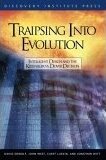
I have decided to look at this decison by means of a review of the Discovery Insitute booklet entitled "Traipsing into Evolution" by DeWolf, West, Luskinand Witt. I had been reluctant to do this without the booklet and I was reluctant to pay the £9.78 necessary to get the booklet. I was hoping that the bulk of the arguments would come out clearly on the web and I could spend my gold on other books. I have finally succumbed to the pressure and purchased the booklet.
There has been a recent brief review of the book at the NRO here. Which resulted in an interesting back and forth between Casy Luskin (here, here and here) and Wesley Elsberry (here)
The criticism in the book is divided into 4 sections:
1. The partisam history of Intelligent Design.
2. The unpersuasive case against the scientific status of ID.
3. The failure to treat religion in a neutral manner
4. The limited value as precedent.
I intend to look at these 4 sections in separate posts. I trust that visitors who remember my promise to look at this decision at some point in the future will be satisfied with this as a fulfillment of my promise.
One sentence that stood out in my reading of the introduction was this...
"... he asserted (that is Judge Jones asserted) that scientists who support ID have published no peer-reviewed articles or research..."
(I wrote in the margin....Did he in fact assert this?)
3 comments:
I find it unlikely that Judge Jones used precisely that phrasing. Behe and Dembski have certainly produced peer-reviewed papers - just not ones that particularly support ID.
"1. The partisam history of Intelligent Design."
If the ID side had wanted to present their own "history of ID," they could have sought out an expert witness to do so. The reason Jones found Forrest's testimony compelling was that she used ID proponents' own words to substantiate her claims.
Given this uncontroverted and substantiated expert testimony, Jones had no choice but to accept it. This is how courts work.
"2. The unpersuasive case against the scientific status of ID."
This case was made by admissions by ID's own witnesses: Behe and Fuller.
"3. The failure to treat religion in a neutral manner"
By its very nature, the trial focused on the religious beliefs of those who were alleged to be attempting establishment of these beliefs. How is this a failure of neutrality?
It should also be noted that (again), only the plaintiffs presented a theologian as an expert witness, therefore (again) the testimony before the court on religion would be weighted substantially in the plaintiffs' favour. If you do not present a witness on a topic, you essentially cede that topic to the opposing side. Again, this is the way that courts operate.
"4. The limited value as precedent."
Decisions don't need to go to the Appellate or Supreme Court level in order to be influential. An example of this is McLean v. Arkansas.
"... he asserted (that is Judge Jones asserted) that scientists who support ID have published no peer-reviewed articles or research..."
What he in fact said was:
"As we will discuss in more detail below, it is
additionally important to note that ID has failed to gain acceptance in the scientific
community, it has not generated peer-reviewed publications, nor has it been the
subject of testing and research.
...
A final indicator of how ID has failed to demonstrate scientific warrant is the
complete absence of peer-reviewed publications supporting the theory.
...
The evidence presented in this case demonstrates that ID is not supported by
any peer-reviewed research, data or publications.
...
On cross-examination, Professor Behe admitted that: “There
are no peer reviewed articles by anyone advocating for intelligent design supported
by pertinent experiments or calculations which provide detailed rigorous accounts
of how intelligent design of any biological system occurred.” (22:22-23 (Behe)).
Additionally, Professor Behe conceded that there are no peer-reviewed papers
supporting his claims that complex molecular systems, like the bacterial flagellum,
the blood-clotting cascade, and the immune system, were intelligently designed.
(21:61-62 (complex molecular systems), 23:4-5 (immune system), and 22:124-25
(blood-clotting cascade) (Behe)). In that regard, there are no peer-reviewed
articles supporting Professor Behe’s argument that certain complex molecular
structures are “irreducibly complex.”17 (21:62, 22:124-25 (Behe)). In addition to
failing to produce papers in peer-reviewed journals, ID also features no scientific
research or testing. (28:114-15 (Fuller); 18:22-23, 105-06 (Behe)).
...
After this searching and careful review of ID as espoused by its proponents,
as elaborated upon in submissions to the Court, and as scrutinized over a six week
trial, we find that ID is not science and cannot be adjudged a valid, accepted
scientific theory as it has failed to publish in peer-reviewed journals, engage in
research and testing, and gain acceptance in the scientific community."
"(I wrote in the margin....Did he in fact assert this?)"
Given that this could be found in a couple of minutes by anybody looking through the decision, I presume that you have not in fact read it?
Allygally,
I did read the judgement when it came out and of course I will study it again as I go through.
Post a Comment